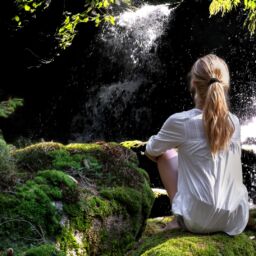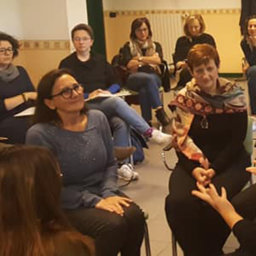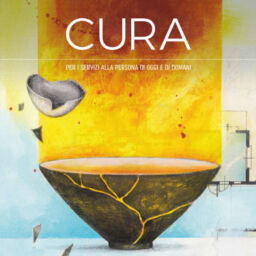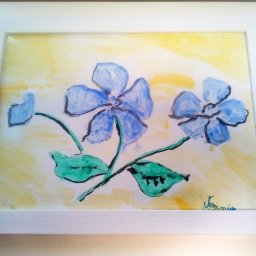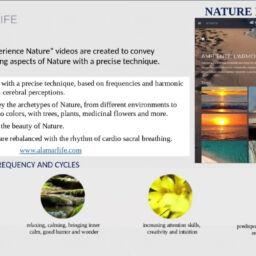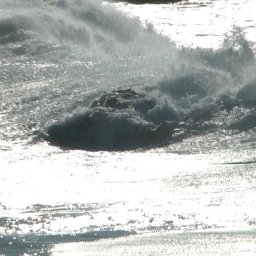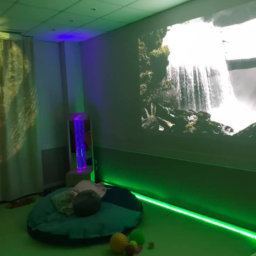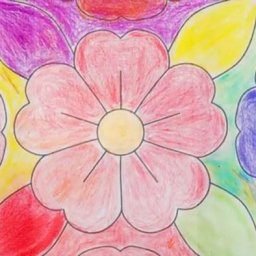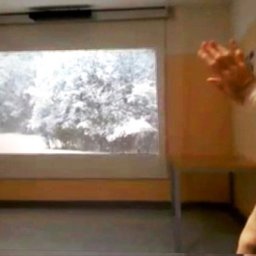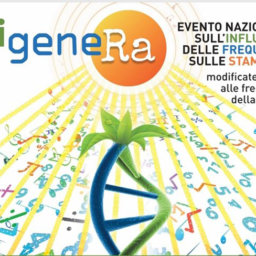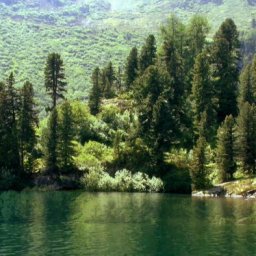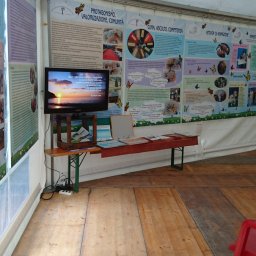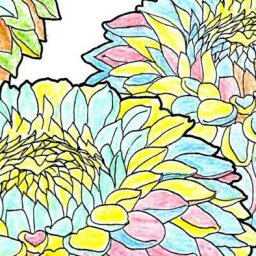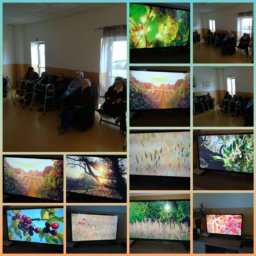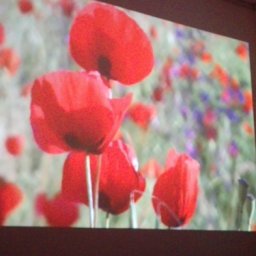MEETING OF CARE PROFESSIONS 2019:
NOT ONLY CARE, BUT HOME TOO
Workshop: EXPERIENCE NATURE CARE, how to use TV therapeutically. A new approach that makes it possible to benefit daily from the regenerative aspects that Nature offers us, while remaining within healthcare residences.
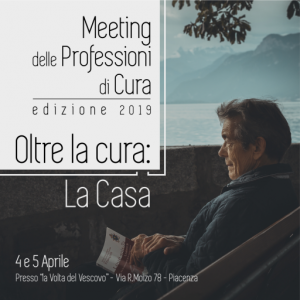
In the 3-hour workshop, Experience Nature, a therapeutic tool based on the beauty and relaxing and regenerating power of Nature, was presented.
In order of appearance, the speakers were:
Cristina Fino, creator and author of Experience Nature, explained the technical/theoretical point of view.
Anna Daccordo, psychologist, explained the therapeutic point of view: what it means to feel at home.
Samanta Noldin, dementia social educator, told how videos were increasingly introduced into the lives of residents and recalled some moving and meaningful testimonies.
Paola Buelli, dementia social educator, described her experience with creative storytelling, which started after the experiential workshop “The Imagined Tale”, Meeting of Care Professions 2018.
Cristina Falomi, dementia social educator, brought her experience with people newly diagnosed with cognitive impairment. Moving were the testimonies of two ladies, who through this activity manage to forget their pathology and relive the beautiful moments of their lives.
Cristina Fino, presenting the 1st therapeutic TV channel, Experience Nature Care.
Angela Eccher, head of the Alzheimer’s special care unit where E.N.Care was tested, explained how emotions linger until the last breath, and how pausing even in silence while looking at living pictures together with the elderly is an enrichment also for the caregivers themselves.
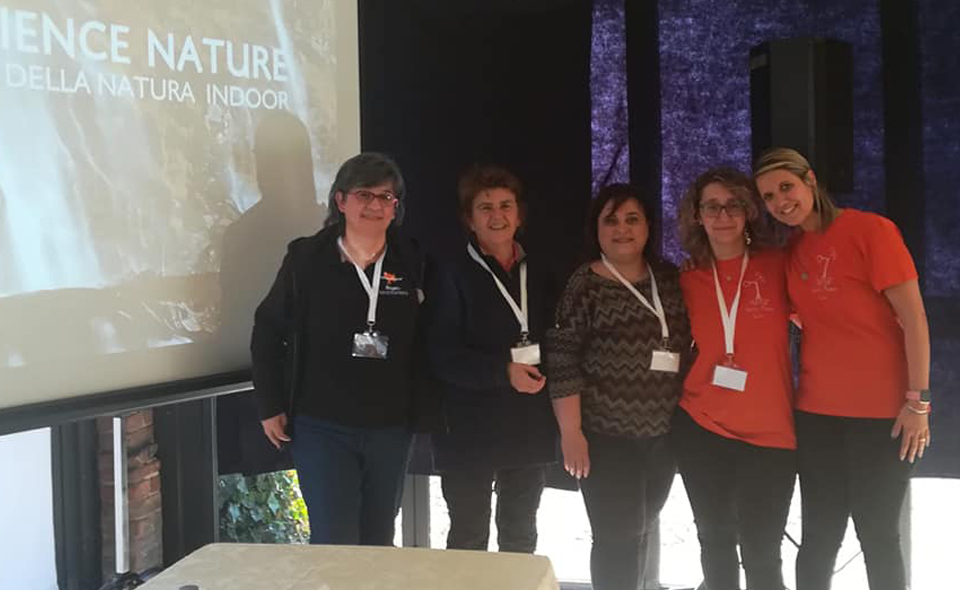
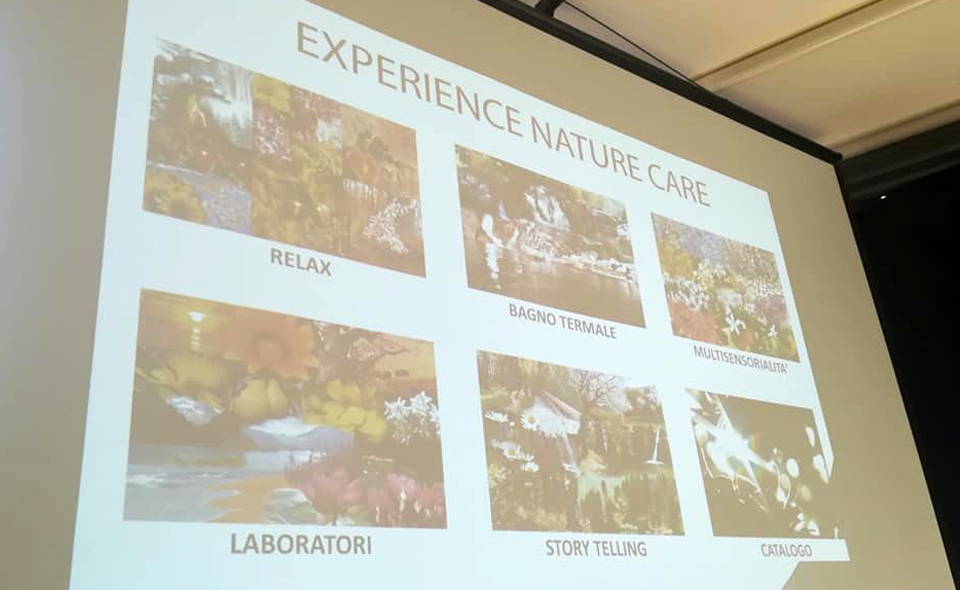
CRISTINA FINO, author of Experience Nature
World theories on the benefits of looking at images of Nature and in particular, the results achieved with Experience Nature: experiments and testimonies. E xplanation of the methodology.
Presentation of the catalogue: 72 single-topic titles and 1500 living pictures, representing environments in the various seasons, colours, plants, flowers.
Feasible activities: creative storytelling, artistic-pictorial workshops, cognitive and sensory stimulation, physiomotricity.
The E.N.Care therapeutic TV channel, to bring the benefits of Nature into the facility, accompanying everyday life with the current seasonality. It encourages time orientation, with punctual appointments to understand the current time, day, month.
ANNA DACCORDO, psychotherapist LTC Santa Maria, Cles (TN) Italy
“I met Cristina a few years ago and immediately found her work extraordinary. It is really a therapeutic tool; it is pure therapy for the soul and the heart. Since we can experience it, she can give us so many unique experiences with the people we care for.
When I watch these videos, I realize that each landscape resonates with me in a different way. There is one place that can go deep inside me, it is as if I put all my pieces in place, and as a good Trentina, that place is the mountains.
Home can mean quiet, calm, protection, safety… and how do we feel when we are at home?”
“In the cognitive dimension, when we come to a place where we really feel protected and safe, our thoughts can slowly find their order. The mind along with the body also becomes quiet. And the emotions? In my home, where I am safe, everything is possible and emotions can flow in their own wave, where they have maximum expression and then quiet down and make room for something else. When we get in touch with an environment that is home all these dimensions of ours realign and we come back into harmony with ourselves, there is a tuning of all our levels.
These videos allow us to return home, to the home within us. You have seen how powerful they can be for us, who still have the ability to go to one of these places if we want to. Instead, our elders inhabit only one place: very often dwelling does not mean finding home.
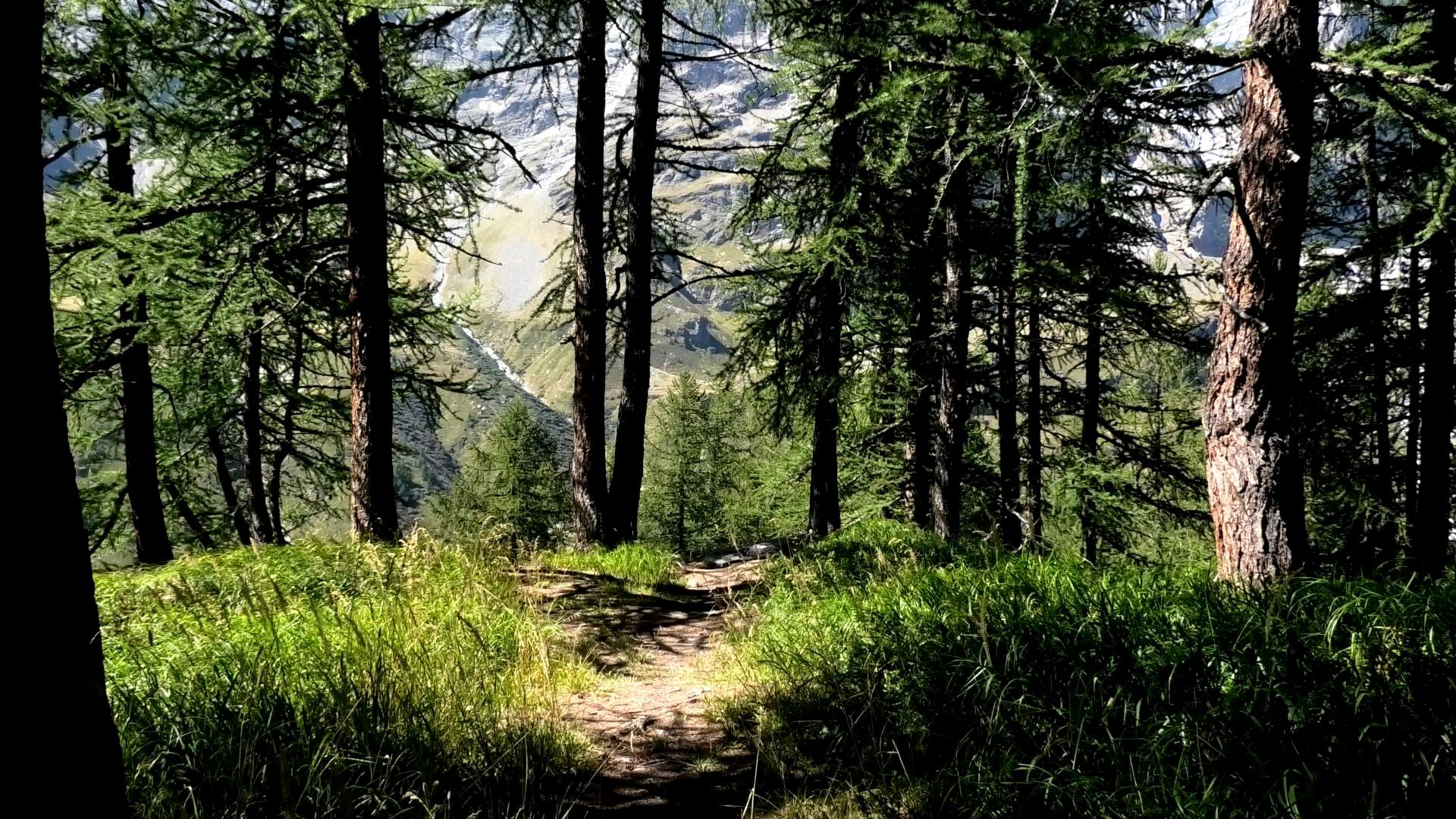
So what can we do?
We can’t take them to the mountain, but we can take the mountain to the facility and make them feel at home again. This is the great power we have, because the moment we give them the chance to be well, to return in peace, in harmony, this is an extreme caring action and can give back moments of life, moments of joy. A moment full of memories, sometimes even a little sad, but full of emotions, of family. The ability to be able to tell, to tell themselves, to remember and relive something that was no longer possible for them to experience. Let’s give them back their lives.
I conclude with a quote from Norberto Bobbio.In the last years of his life he left this testimony as support for the design of care services:
“One’s home gives security, defends you from the unknown, from the unexpected, from finding yourself in a world that by now, enclosed within four walls, has become increasingly foreign to you. The older you are, the deeper the roots, and therefore the more difficult to bear uprooting, going elsewhere where you would find yourself lost, lose your identity, become a number among other numbers.”
And that’s not what we want, we want them to be able to find themselves and be them in our facilities as well.
Cristina has given us a great chance in this.”
SAMANTA NOLDIN, dementia social educator LTC Santa Maria, Cles (TN) Italy
“We did an activity with people who were a bit sad. We tried to use Cristina’s videos for relaxation and a world opened up to us, because it wasn’t just a moment of relaxation, it was really a moment in which ‘I tell you what I feel, I tell you how I am’. So, we thought we would also use them in all the lounges on the floors.
In the morning, while they are waiting for breakfast, we turn on the DVD, which can be of a lake, rather than flowers, whatever we decide together with them anyway, and the smile immediately comes out. The moment of waking up is completely different.
We had two residents who didn’t want to eat anymore, because they were probably tired, they would tell you, “I don’t want to live anymore, so I don’t eat.”We put the fruit dvd, rather than the garden dvd, and eventually they started eating on their own, on their own. And even at night, when “I want to go to sleep, however, they don’t accompany me there,” they stay in the living room, but with the dvds they relax, they are calmer.
Then I met Cristina, who told me about creative storytelling. Romeo had not spoken for two years, no longer expressing any emotion. We still accompanied him to the sessions because he liked to watch the videos. One day I played the sea video and out of the blue we hear, “Ah, the sea!”
Romeo starts telling us that he asked his wife, kneeling on the beach, to get married. They later got married and returned there on their honeymoon. And he told us about his honeymoon… The next day I call his daughter and tell her what had happened. She did not know the story, but she was puzzled because she knew that her father was no longer speaking. Together with her we went back to Romeo: “but dad, is it true you saw the sea video yesterday?” And he answered yes and told the whole story to her as well.
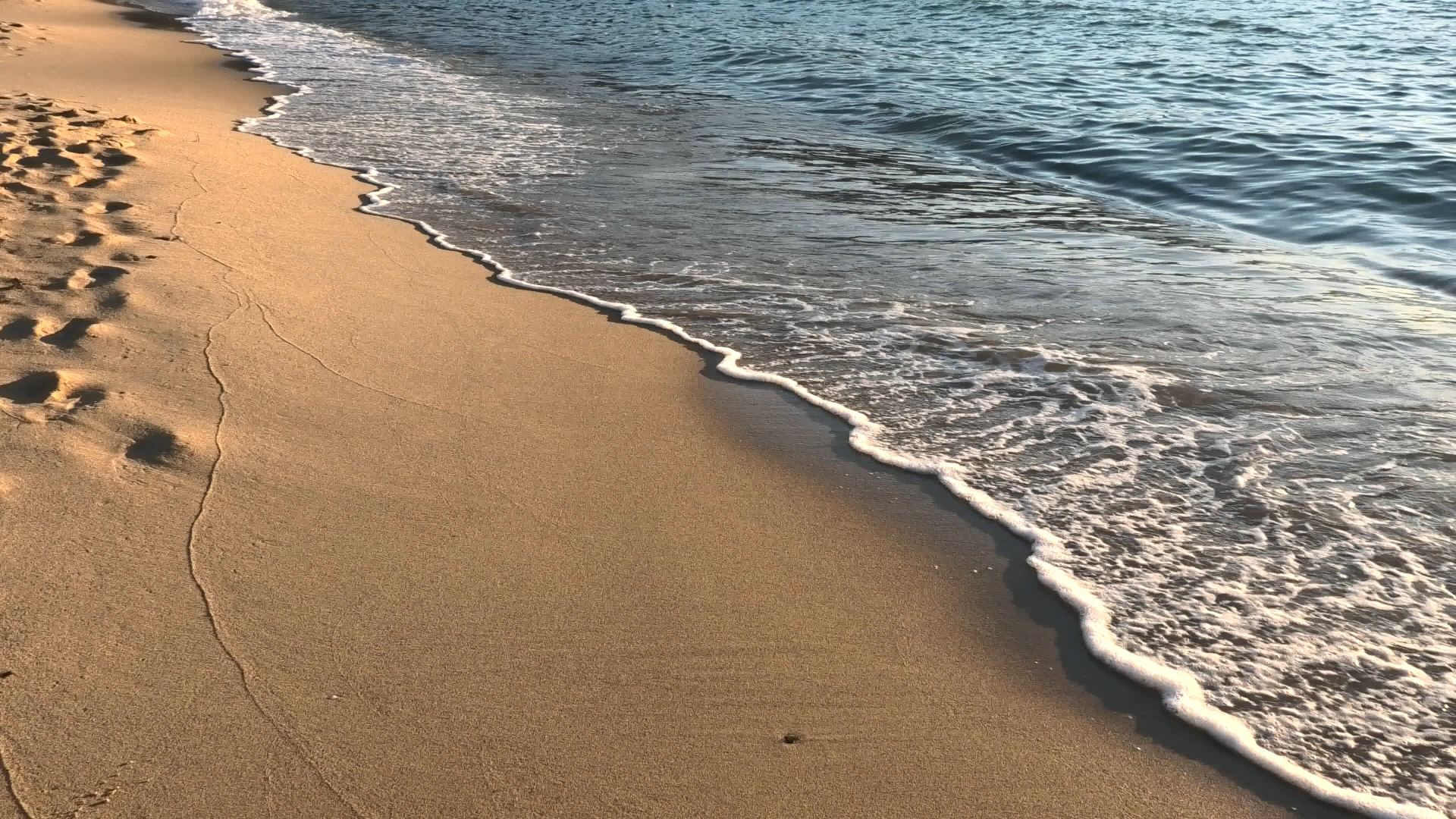
There is a big difference between what Cristina did and Natura’s other videos. The other day, the caregiver’s report said: “the person was quite agitated, so I put in a natura video but it didn’t work”. They don’t have a DVD in that room, so I went up and asked what video he had put: ‘I looked it up on the internet and put a nature video’. I connected the DVD to the TV and put the mountain DVD on him: 30 seconds later he was lying on the bed, calm and relaxed‘.
PAOLA BUELLI, dementia social educator Casa Serena care home, Brembate di Sopra (BG) Italy
“For us, storytelling is not really creative storytelling, it is much more autobiographical storytelling. The nice thing is that they recognise the places, the mountain is their mountain. And when they name the place, the tale begins.
Ours is now a consolidated group and we have roles: there’s the lady who gives the title, there’s the countryside expert… and there are those two or three who want to tell the story the most, so they act as a driving force. But everyone, really everyone, contributes to the story“.
CRISTINA FALOMI, dementia social educator Giglio Blu care home, Perugia, Italy
“Especially in the initial phase of cognitive decline, what I can observe is that the person is scared, they are afraid. Their thinking is about ‘who I am now, what I have become and what I will become’. They exclude everything good that has passed, they don’t bring it to mind. These workshops allow us to bring out the good in their lives, the positive, memories they thought were no longer there.
Both people with mild cognitive decline and their care givers participate in these workshops. We asked them to bring objects they used to go to the beach and each of them brought something.
I have given you the example of a lady who really moved me because this is what comes out of my work: to make them feel good, to bring back those memories that are precious to them and that give them back their role, peace and identity.
I think the caregivers have a hard time accepting the suffering of the memory, because it is easier to say ‘but don’t think about it’.
Instead, she says: “No, let me relive these emotions, because even if they have passed, I was well at that moment“.
In my opinion this is making them stay at home, allowing them to remember, creating those situations that make them come back. Then she went to lunch and kept saying to the caregiver: ‘But I would never have believed I would do that trip again, I would never have imagined it’. She relived the honeymoon she had taken with her husband and that’s why she was so moved, because for her that moment was beautiful”.
CRISTINA FINO, author of Experience Nature
First public presentation of E.N.Care, the device created to solve all the problems associated with using DVDs: lack of themes, lack of time, lack of knowledge of naturopathy.
A complete therapeutic tool, 24 hours a day, every day of the year, created to accompany and improve life in care places through the beauty and regenerating power of Nature.
It helps contextualise time while remaining within the facilities: it marks the various phases of the day, encourages recognition of the days of the week and the changing of the seasons. It supports workshops and therapies.
ANGELA ECCHER, DEDICO Process Manager, LTC C. Vannetti, Rovereto (TN) Italy
Our residents already arrive with very severe cognitive impairment. In the facilities sometimes the environmental beauty is not there, and this is one reason why behavioral disorders can be amplified.
With the Alamar Life video experience we experienced, in addition to memories, emotions. Emotions remain until the last breath. Stirring up emotions in them, or to stand with them in front of these living pictures that arouse emotions, even in silence, is something everyone can do, and living these moments with them also arouses emotions in us caregivers, which we can take home as emotional baggage that we can retrieve in difficult moments of our work.
Read the article SENTIRSI A CASA, LA NATURA COME FONTE DI BENESSERE
Care & Management, April 2019


